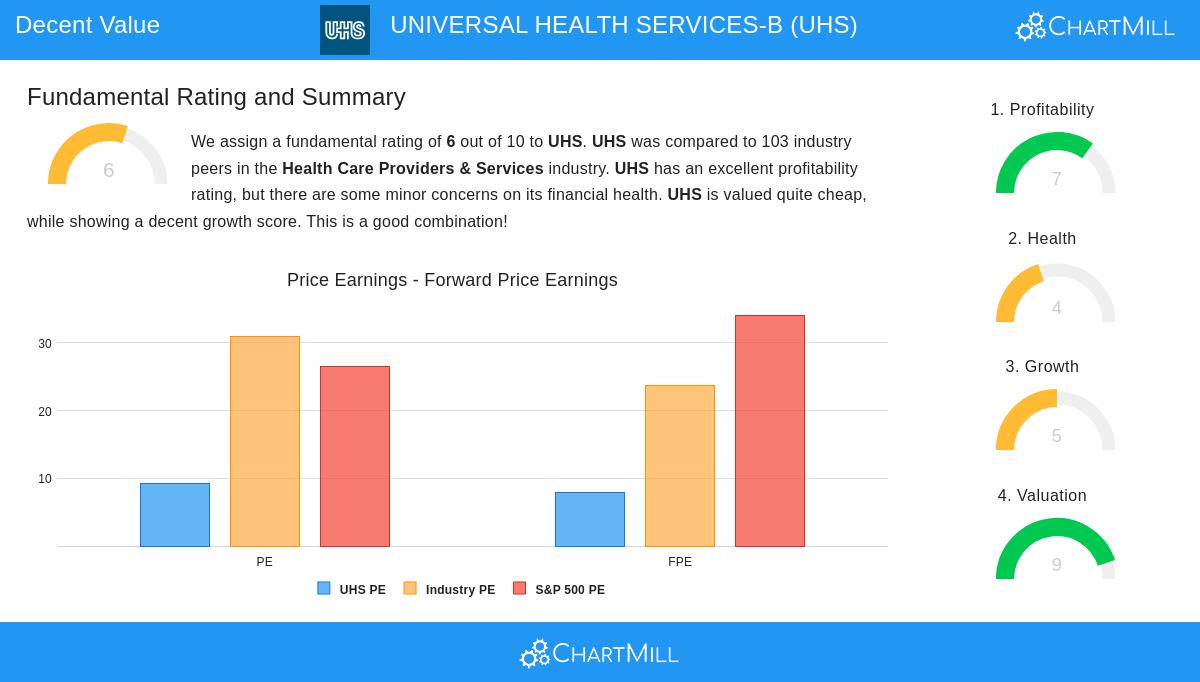Universal Health Services (NYSE:UHS) has become a possible choice for value investors after meeting the criteria of a "Decent Value" screening process. This method finds stocks with good fundamental valuations, scoring above 7 on ChartMill’s valuation rating, while also showing reasonable results in profitability, financial health, and growth. The strategy follows classic value investing ideas, which look for companies trading below their true worth but with strong basic financials.

Key Fundamentals Highlighting UHS as an Undervalued Stock
1. Favorable Valuation Metrics
UHS earns a 9 out of 10 in ChartMill’s valuation rating, showing it is priced lower than its earnings and cash flow suggest. Key points include:
- Low P/E Ratio: At 9.16, UHS’s price-to-earnings ratio is much lower than the industry average (30.98) and the S&P 500 (26.51). This indicates the stock is priced modestly compared to its earnings.
- Discounted Forward P/E: The forward P/E of 7.94 further supports the stock’s low valuation, making it cheaper than 90% of its healthcare competitors.
- Good Enterprise Value/EBITDA: The company’s EV/EBITDA ratio is strong, placing it in the bottom 14% of its industry for valuation.
For value investors, these metrics imply UHS is trading below its actual value, offering a possible safety net—a key idea in value investing.
2. Strong Profitability
Even with its low valuation, UHS holds a profitability rating of 7/10, backed by:
- High Return Metrics: The company has an ROA of 8.41% (better than 91% of peers) and an ROE of 17.94% (ahead of 85% of the sector).
- Stable Margins: Operating margins are 11.01%, ranking in the top 18% of the industry, while net profit margins (7.66%) are also above average.
These numbers show UHS is not only inexpensive but also well-run and capable of generating good returns on capital, lowering the chance of a "value trap."
3. Fair Financial Health
UHS scores 5/10 in financial health, with some strengths and minor weaknesses:
- Controlled Debt: The debt-to-equity ratio (0.65) matches industry standards, and the company has been reducing its share count—a positive sign for shareholders.
- Liquidity Factors: While the current ratio (1.29) and quick ratio (1.19) are acceptable, they fall short of some peers, indicating potential for better short-term liquidity.
Though not perfect, UHS’s balance sheet does not show major concerns, making it a reasonable option for value investors who want stability along with low pricing.
4. Consistent Growth Potential
With a growth rating of 5/10, UHS displays a mixed but encouraging path:
- Past Growth: EPS grew by 37.47% over the last year, with revenue increasing at 9.61%.
- Future Estimates: Analysts predict 10.77% annual EPS growth, though revenue growth might slow to 4.61%.
While not a rapid-growth stock, UHS provides steady earnings improvement—an important factor for value investors seeking long-term returns.
Why This Is Important for Value Investors
Value investing relies on spotting stocks where the market price does not match the company’s real financial health. UHS fits this description: its low valuation ratios, combined with solid profitability and controlled debt, suggest it may be undervalued. The company’s stable growth and industry standing also lessen the risk of a value trap.
For more details on UHS’s fundamentals, check the full ChartMill fundamental report here.
Find Other Undervalued Stocks
If UHS matches your investment approach, you might discover other options by using the Decent Value Stocks screener, which selects stocks with good valuations and reliable fundamentals.
Disclaimer: This analysis is for informational purposes only and does not constitute investment advice. Always conduct your own research or consult a financial advisor before making investment decisions.





